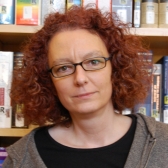
"Shameful Images: German Responses to Allied Documentaries on Nazi Concentration Camps"
Professional Background
Ulrike Weckel received her habilitation at the Technical University of Berlin and received the venia legendi (the right to teach) for “Neuere und Neueste Geschichte” (early modern and modern history). She received her Ph.D. in history and her Erstes Staatsexamen (M.A. equivalent) from the University of Hamburg. During her tenure at the Museum, Dr. Weckel was Visiting Associate Professor at the University of Michigan, Ann Arbor. For her Charles H. Revson Foundation Fellowship for Archival Research, she conducted research for her project, “Shameful Images: German Responses to Allied Documentaries on Nazi Concentration Camps.”
Dr. Weckel’s publications include two co-edited anthologies and books: “Bestien” und “Befehlsempfänger”: Frauen und Männer in NS-Prozessen nach 1945 [“Bitches” and “Men under Orders”: Women and Men in Nazi Crime Trials after 1945] (Vandenhoeck & Ruprecht, 2003) and Zwischen Karriere und Verfolgung. Handlungsräume von Frauen im nationalsozialistischen Deutschland [Between Career and Persecution: Women’s Agency in Nazi-Germany] (Campus, 1997). She is also the author of over twenty-five articles written on topics such as gender studies in German-speaking Europe, Wolfgang Staudte’s films during the Cold War period, and the role of gender in Nazi trials. Dr. Weckel is the recipient of several awards, including the Marie Curie Intra-European Fellowship of the European Commission from the European University Institute, Florence; a Research Fellowship from the International Research Center for Cultural Studies, Vienna; and a Post-doctoral Research Grant from the German Historical Institute, Washington, DC. She has lectured widely on 18th–20th century German and European history.
Fellowship Research
During her tenure at the Museum, Dr. Weckel revised her Habiltitationsschrift into a book manuscript entitled “Beschämende Bilder. Deutsche Reaktionen auf alliierte Dokumentarfilme über befreite Konzentrationslager” [Shameful Pictures: German Responses to Allied Documentaries on Liberated Nazi Concentration Camps]. Her project explored German-audience screenings of Allied documentaries about liberated Nazi concentration camps by examining how the screenings were conducted, how the Allies monitored or interrogated the viewers, and what the audiences’ responses revealed. In addition to reconstructing and analyzing ten different “atrocity films” of 1945, the project included case studies investigating three different audiences: the defendants in the Nuremberg International Military Tribunal, prisoners of war in British and American captivity, and civilians in all occupied zones of Germany. Dr. Weckel completed the research for her project using the Museum’s photo, film and video collections and also researched the ways in which visitors respond to the Museum’s Permanent Exhibition as it related to her project.
Dr. Weckel was in residence at the Mandel Center from May 1 to October 30, 2008.
